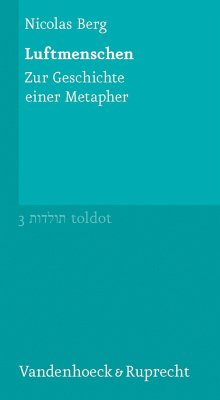Concept and discourse of the "Jewish Luftmensh" has a double meaning around 1900: It functions not only as a metaphor for what the 19th century bequeathed to the 20th in form of the "Jewish Question", but also as a critical comment on modernity as a whole. In cooperation with the field of the so called "Völkerpsychologie" - highly regarded at that time - a kind of national social psychology was established, in which Jews were perceived and described as "rootless". The book will analyze the cultural upspring, development and change of this metaphor with examples from economy, theology, philosophy, science and literature.
Dieser Download kann aus rechtlichen Gründen nur mit Rechnungsadresse in A, B, BG, CY, CZ, D, DK, EW, E, FIN, F, GR, H, IRL, I, LT, L, LR, M, NL, PL, P, R, S, SLO, SK ausgeliefert werden.









